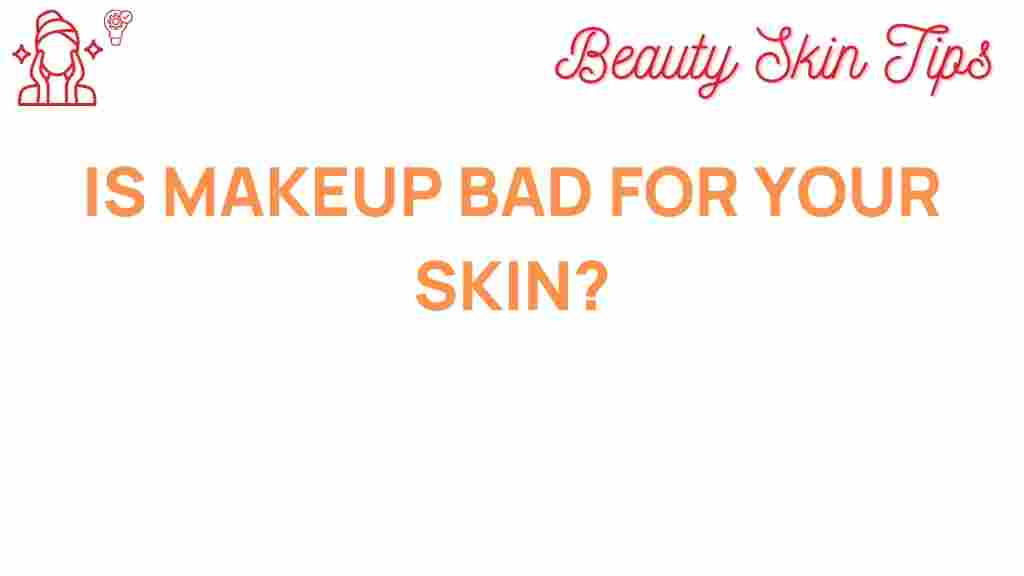Is Makeup Bad for Your Skin?
The beauty industry is booming, and makeup is a staple in many people’s daily routines. However, questions often arise about the potential effects of makeup on skin health. Is makeup bad for your skin? This article aims to unveil the truth behind cosmetics and their impact on your complexion, helping you make informed choices.
Understanding Makeup and Its Ingredients
Makeup products come in various forms, including foundations, concealers, powders, blushes, eyeshadows, and lip products. Each of these products is composed of different ingredients, some of which can be beneficial, while others may pose risks to your skin.
- Foundations: Often contain oils, silicones, and pigments.
- Concealers: Usually thicker in consistency and may contain heavy waxes.
- Powders: Can be mineral-based or contain talc.
- Blushes and Eyeshadows: May include dyes, preservatives, and various fillers.
- Lip Products: Often contain waxes, oils, and pigments.
Understanding the ingredients in your makeup can help you determine whether it’s suitable for your skin type. For instance, individuals with oily or acne-prone skin might want to avoid products with heavy oils or comedogenic ingredients.
The Potential Risks of Makeup
While makeup can enhance your appearance and boost your confidence, it also comes with potential risks. Here are some common concerns associated with makeup use:
- Clogged Pores: Heavy foundations can block pores, leading to breakouts.
- Skin Irritation: Fragrances and preservatives in makeup can cause allergic reactions.
- Acne: Some products may worsen existing acne or trigger new breakouts.
- Dryness: Certain formulations can strip moisture from your skin.
- Long-term Effects: Prolonged use of certain ingredients may lead to premature aging.
Choosing the Right Makeup for Your Skin Type
To minimize the negative effects of makeup on your skin, it’s essential to choose products that align with your skin type. Here’s a guide:
1. Oily Skin
Look for oil-free and non-comedogenic products. Powder foundations and mattifying primers can help control shine.
2. Dry Skin
Opt for hydrating foundations and creamy formulas. Ingredients like hyaluronic acid and glycerin can provide moisture.
3. Sensitive Skin
Choose hypoallergenic and fragrance-free products. Mineral makeup is often gentler on sensitive skin.
4. Combination Skin
Use a mix of products, like a mattifying primer for oily areas and a hydrating foundation for dry spots.
Applying Makeup Safely
Application techniques are just as important as the products you choose. Here are some tips to ensure safe makeup application:
- Clean Brushes: Regularly wash your makeup brushes and sponges to prevent bacteria buildup.
- Patch Test: Always patch test new products on a small area of skin.
- Remove Makeup Properly: Use gentle cleansers or makeup removers before bed to avoid clogged pores.
- Limit Wear Time: Try to avoid wearing makeup for extended periods, especially overnight.
Step-by-Step Makeup Routine for Healthier Skin
Follow this step-by-step routine to ensure your makeup application is both effective and skin-friendly:
- Cleanse: Start with a gentle cleanser to remove any impurities.
- Moisturize: Apply a suitable moisturizer based on your skin type.
- Prime: Use a primer to create a smooth base for your makeup.
- Foundation: Choose a foundation that matches your skin type and tone.
- Conceal: Apply concealer to any blemishes or dark circles.
- Set: Use a setting powder if necessary, focusing on oily areas.
- Add Color: Apply blush and eyeshadow, opting for softer formulations.
- Finish: Complete your look with mascara and lip color.
- Remove: At the end of the day, use a gentle makeup remover.
Common Makeup Myths
There are several myths surrounding makeup and skin health that can lead to confusion. Let’s debunk some of the most common ones:
- Myth 1: All makeup is bad for your skin.
In reality, many products are formulated with skin-friendly ingredients. - Myth 2: Mineral makeup is always better.
While mineral makeup can be gentler, it still depends on individual skin types. - Myth 3: Makeup causes acne.
Makeup can contribute to breakouts, but it’s usually due to specific ingredients or improper cleaning. - Myth 4: You should never wear makeup if you have acne.
With the right products and techniques, you can wear makeup without worsening acne.
Troubleshooting Skin Issues Related to Makeup
If you experience skin issues while using makeup, here are some troubleshooting tips:
- Breakouts: Examine your products for comedogenic ingredients and consider switching to non-comedogenic options.
- Redness or Irritation: Discontinue use of any products that cause discomfort and consult a dermatologist if necessary.
- Dry Patches: Ensure you are moisturizing adequately and consider using hydrating makeup products.
- Oily Skin: Use mattifying products and consider incorporating blotting papers throughout the day.
Conclusion: Making Informed Choices About Makeup
So, is makeup bad for your skin? The answer is not a simple yes or no. Makeup can have both positive and negative effects on your skin, depending on the products you choose and how you apply them. By understanding your skin type, selecting the right products, and practicing safe application techniques, you can enjoy the benefits of makeup without compromising your skin health.
For more information on skincare and makeup, check out this comprehensive guide on maintaining healthy skin. Remember, your skin is unique, so listen to its needs and adjust your makeup routine accordingly.
In summary, makeup doesn’t have to be a foe to your skin. With the right knowledge and care, you can enhance your beauty while keeping your skin healthy and glowing. Always prioritize skin health, and make informed choices to enjoy the best of both worlds.
This article is in the category Skincare and created by BeautySkinTips Team
